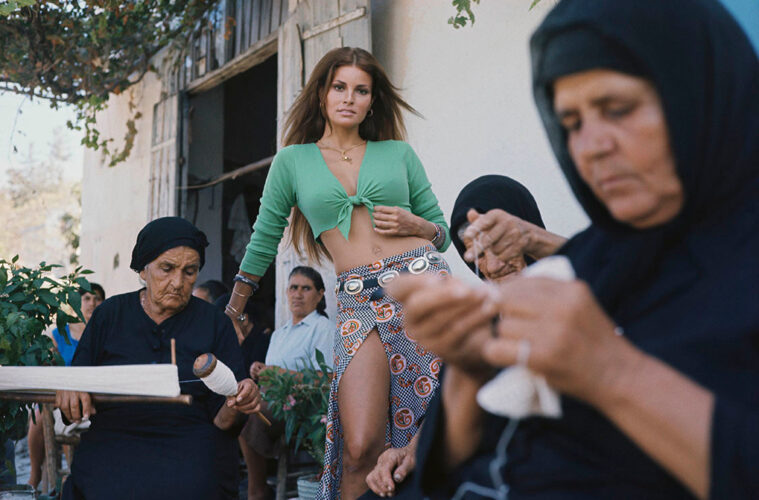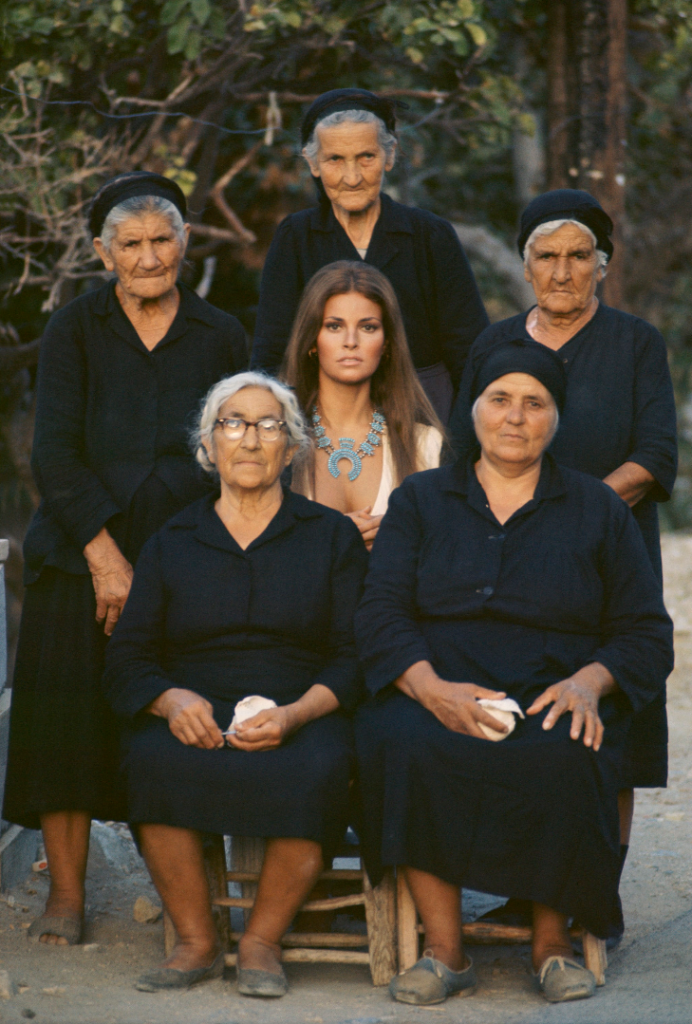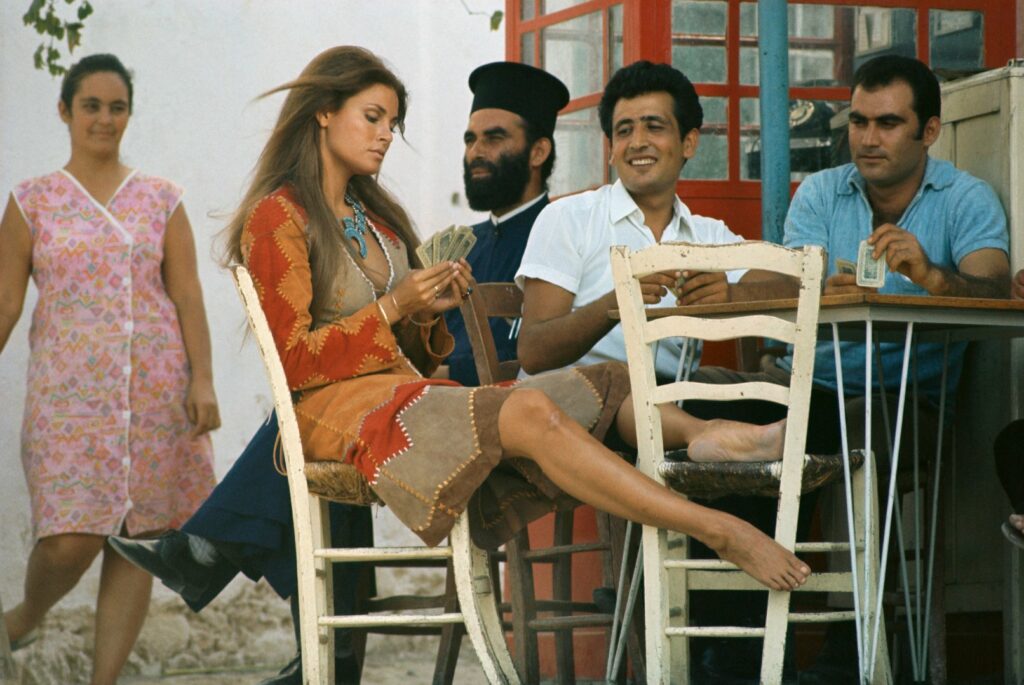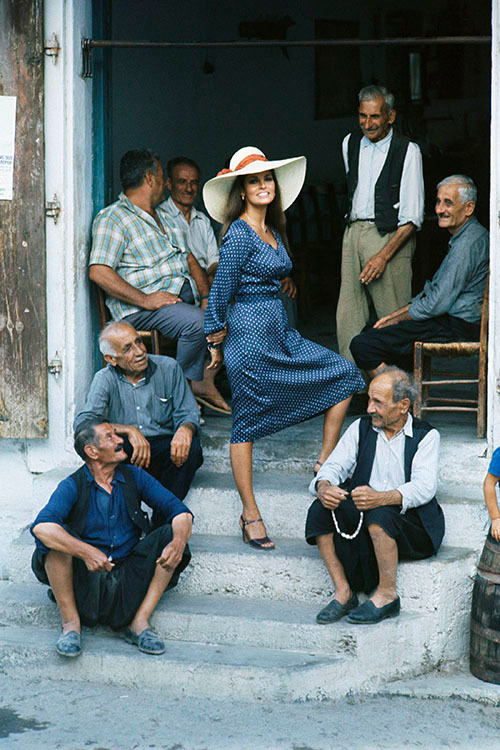Words by Anastasia Gavala
Visuals from Film ‘The Beloved and Restless (Sin)’ for Raquel Welch, by George P. Cosmatos, 1971.
This article is part of the “My Hair My Hair” issue.
“It is painful to be beautiful.” The words of a beautician echo in my head while I remember my first experience of hair removal. My legs were left red and raw from the wax, yet I immediately felt more confident. I must have been about 11 at the time. It is ironic that a result of the pain was indeed that I felt more beautiful.
The beauty salon, the aesthetician’s work space, was a site of freedom for me. Hairlessness allowed me to stop my high school and university peers from commenting on my hairy arms and legs, and ultimately to wear the revealing clothes I wanted to wear. When I was a teenager, I was acutely aware of how hairy I was. I remember begging my mum to let me get my unibrow removed and to wax my legs and arms after being teased. For a long time after, I detested my eyebrows and had moments when I obsessively tweezed them to half of their usual width; I frequently attended waxing and tweezing appointments.
Without hair removal, I felt dirty. Yet increasingly so, I have discovered the salon to be a space where colonial ideas of “propriety” are continually perpetuated, in the realm of the aesthetic, but also the linguistic. Propriety, as I understand it, refers to accepted models of living one’s life, which can include behavior, language and appearance. But the specificities of accepted behavior, language and appearance do not exist in a vacuum: rather they are the byproduct of invisibilised, colonial value systems.
Colonial imprint
What version of beauty are we referring to when we assume that “hairlessness = beauty”? In the European imaginary, sufficient differentiation between genders is a mark of racial superiority or inferiority, and ”hariness” was one key locus in this differentiation.1 The “ungroomed hairiness” of non-White women – including SWANA (South West Asian and North African) and South Asian women2 – became a marker of racial inferiority that further legitimized colonial conquest.
American actress Raquel Welch during the filming ‘The Beloved and Restless (Sin)’ (1971), in Cyprus, 1970.
There is a long history of colonizers viewing Cypriot women as ‘unsightly’, ‘ugly’, ‘primitive’, and unrefined due to their ‘dark-skinned’ complexions, ‘Oriental’ features, and hairiness.3 This attitude partially justified British colonizers’ drive to conquer my motherland: they were shocked and disgusted by what they viewed Cyprus and its people to be: a degraded, corrupted, mongrelized iteration of their beloved illusion of white, Hellenic antiquity. They insulted and derided our darker-skinned, hairy, peasant women, with their mustaches, sideburns, unibrows, and crooked noses. They wanted to restore our island to its alleged former glory: whiteness. 4
Thus, many Cypriot women (including my friends and myself), the majority of whom do not pass as white, find themselves feeling ashamed for their thick body hair and desire to conform to the ideals and confines of white femininity. The colonial period introduced and created certain ideas of beauty as the ultimate, timeless truth, and these ideals persist in the way they have shaped our modern society. Thus Cypriot women, from the colonial period to our current “post”colonial moment, continue to suffer from the pressure of these aesthetic expectations; many of us find ourselves feeling ashamed for our thick body hair, and thus feel an intense desire to conform to the ideals and confines of white femininity.
Hair and propriety
Once, after arriving for an appointment for an arm, leg, underarm, and Hollywood wax, a Cypriot beautician gave her opinion on the hairiness of other parts of my body. She shamed me for it, suggesting that I wax my upper lip, unibrow and stomach. At one point, she pointed to a single thick black hair on my stomach, saying “it’s not on”: this is a colloquial British saying meaning that she found it to be unacceptable.
American actress Raquel Welch during the filming ‘The Beloved and Restless (Sin)’ (1971), in Cyprus, 1970.
Why did the hairs on my unibrow, upper lip, and stomach irritate her so much? I crafted a narrative to make sense of her pushiness. Perhaps she had internalized the colonizer’s narrative and was projecting how she felt about herself onto me. This certainly appears so given the fact that she looked me in the eye and emphatically stated “I am hairless from below the eyebrows”. When I look back at this experience, I realize the salon to be a space where hairiness is policed in the unwitting service of what I believe to be a colonial ideal of propriety: the idea that hairy femininity is dirty, and must be contained.
It is not uncommon for those who have been orientalised or racialised to then internalize and impose those same racialised beauty standards upon other members of their community. Legacies of colonialism remain as psychological imprints in the minds of those subjected to colonial regimes.5 From the beauty that is venerated in the media, to the comments made by our families, the idea that hairiness is “unfeminine” is drummed into us from the moment we are born and in such an intense way, that we internalize the idea as truth. This “truth” then informs our “choice” to remove our hair. We believe this desire becomes of our own volition, despite the value systems and frame of reference informing this decision not being ours.
Propriety beyond hairlessness: Vernacular propriety
My regular beautician is a lady of Greek descent. For the longest time, I would make a deliberate attempt to speak to her in Standard Greek, despite it not being my indigenous tongue. At my most recent appointment, I decided to speak my indigenous dialect of Cypriot Greek. I was met with disapproval: “your Cypriot accent isn’t the issue, it’s the fact that you don’t use the proper words and will use the Cypriot variations instead.” I was told I should be proud of our “shared Greekness.”
Personally, I view both Greekness and Turkishness to be colonial impositions onto the Cypriot identity. After all, British colonial education encouraged the imposition of Standard Greek/Turkish vernaculars, which “estrange[d] Cypriots from indigenous vernaculars,”6 and thus contributed to the “racialisation of religious identity”7 through divide and rule: under British colonialism, Cypriots were split and pitted against each other through the labels of Greek and Turkish, and their respective ethno-nationalisms, thus “replac[ing] the religious identity of the Cypriots with an imagined ethnic identity”.8 The existence of two dichotomous and irreconcilable Cypriot identities – “Greek” and “Turkish” – is an enduring legacy of the British colonial period, and explains the importance of “mainland” ethno-nationalisms in both the Greek-speaking Cypriot and Turkish-speaking Cypriot imaginary.
American actress Raquel Welch with a group of men on the set of the film ‘The Beloved (aka Sin and Restless)‘ directed by George P. Cosmatos, in Cyprus 1970.
In the space of the salon, I was again policed, this time for my language. My native Cypriot vernacular was not deemed “proper” enough. Obviously, I cannot assume to know my beautician’s exact intentions or thoughts, yet her words about propriety seemed to be part of that same thread of colonial civilizing discourse that had historically been used to subjugate Cypriots: the idea that we need to be condescendingly guided away from indigeneity, and into modernity.
Colonialism beyond territory
What interests me about the lasting imprints of colonialism, aside from the territorial, is that they persist oftentimes both psychologically and discursively in a multitude of ways. They persist through internalization, through influencing our value systems and the way we think about ourselves. And they persist through judgment, through others demanding that we be “proper” in our appearance and in the way that we speak.
Legacies of colonialism(s) can creep into the most unexpected of situations. In the salon, both my body hair and dialect were implicated. In what is often deemed to be a “post-colonial” world, our experiences can serve as a reminder that colonial dynamics continue to affect our lives on the most intimate and personal of levels.
- Rebecca Herzig, Plucked: A History of Hair Removal (New York University Press, 2016) via @alokvmenon (Instagram, 14 August 2022). Accessed at https://www.instagram.com/p/ChQVTsUuBHe/
- Henna Amin, “the erasure of brown women from the body hair movement is nothing new, but this time we’ve had enough” (Mxogyny, 11 March 2021). Accessed at https://www.mxogyny.com/pieces/the-erasure-of-brown-women-from-the-body-hair-movement-is-nothing-new-but-this-time-weve-had-enough
- Michael Given, Corrupting Aphrodite, colonialist interpretations of the Cyprian goddess in Bolger and Serwint (eds) Engendering Aphrodite: Women and Society in Ancient Cyprus (American Schools of Oriental Research, 2002). Accessed at https://core.ac.uk/download/pdf/1393592.pdf; Jean Christou, “‘Middle aged, unattractive and foreign’: the Cypriot murderess” (CyprusMail, 31 January 2016). Accessed at https://cyprus-mail.com/2016/01/31/middle-aged-unattractive-and-foreign-the-cypriot-murderess-2/; Lizzy Ioannidou, “Shattered image: not ‘an island of Aphrodites’” (CyprusMail, 24 February 2019). Accessed at https://cyprus-mail.com/2019/02/24/shattered-image-not-an-island-of-aphrodites/
- Paragraph inspired by conversations the author had with @cypriotess_in_distress and by her social media posts.
- Frantz Fanon, Black Skin, White Masks (1952), pxvi. Accessed at https://monoskop.org/images/a/a5/Fanon_Frantz_Black_Skin_White_Masks_1986.pdf; Walaa Alqaisiya, Palestine and the Will to Theorise Decolonial Queering (Middle East Critique 29[1], 2020). Accessed at https://www.lse.ac.uk/middle-east-centre/assets/documents/Palestine-and-the-Will-to-Theorise-Decolonial-Queering.pdf
- Daniele Nunziata, Colonial and Postcolonial Cyprus: Transportal Literatures of Empire, Nationalism, and Sectarianism (Palgrave Macmillan, 2020), p7.
- @Anthony1983, “There’s so much more to say regarding British divide and…” (Twitter, 26 August 2018). Accessed at https://twitter.com/Anthony1983/status/1033674431846072320
- Andrekos Varnava, British Imperialism in Cyprus, 1878-1915: the Inconsequential Possession (Manchester University Press, 2009), p153.




